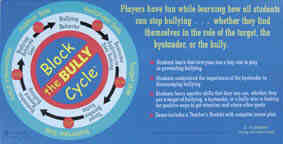| Educational
Objective: The student will react appropriately when bullied
by another student.
Language Arts Standard: Listening and Speaking
Materials
Needed:
The Prop Box with Costumes
Brainstorm Form
Appropriate Rubric: One for each student to complete during
each role play 
|
The Lesson:
• Identify Need
• Introductory Activity: Read an article from a newspaper.
Avoid a classroom discussion of personal experiences. Get
information from one of our Internet web sites on Bullying.
• Define Steps and Sequences of Skill
1.
Look at the person and use his name.
2. Remain calm and breathe deeply.
3. Use a neutral tone of voice and body language.
4. Request the bully that you can take care of yourself.
5. Remove yourself from his circle as soon as possible.
6. Report your experience to a grownup.
• Model the Skill
• Role Plays/Classroom Discussion- Complete Role Play
Rubric
• Applications
• Independent Uses
Rubric
for the Role Plays
Student
(Speaker)____________________________ Student (Subject)____________________________
Date: _____________________ Observer's
Name:___________________________________________
| Observations: |
No |
Yes |
|
Did the student look at the person and use his name? |
|
|
| Did
the student remain calm and breathe deeply? |
|
|
| Did
the student use a neutral tone of voice and body language? |
|
|
|
Did the student inform the bully that he could take care
of himself? |
|
|
| Did
the student remove himself from his circle as soon as
possible? |
|
|
|
Did the student report your experience to a grownup? |
|
|
Score/Points |
|
|
Additional
Comments: _______________________________________________________________________
_________________________________________________________________________________
District Video On Bullying:
"Peacetalks: Dealing with Bullies, Troublemakers &
Dangerous Situations" VHS 4466 Grades 6- 12 Producer
HRT 30 minutes 1997
See also web sites on Bullying

New Game! See www.incentivesplus.co.uk
| Playing ‘Block The Bully
Cycle’ clearly shows how bullying is frequently
unintentionally reinforced by bystanders who laugh at
mean jokes, confer social status to bullies, or simply
stand by and let bullying happen. Students will learn
practical skills that they can use if they are:
· A target of bullying seeking non-violent skills
for prevention
· A bystander who wants to discourage bullying
· A former bully who wants to gain popularity
without resorting to bullying
The game intentionally avoids putting players in the
role either of the intended victim or the bully, avoiding
embarrassment and defensiveness.
Game includes a Teacher’s Booklet and complete
lesson plan.
2 – 6 players Age 13+ |
|
See also "Steps to Respect: A Bullying Prevention Program"
www.cfchildren.org. The program is also mentioned in our Resources
section of this website.
Other
Standards Address in Lesson:
6th
Grade
Speaking Applications:
2.4 Offer a logical sequence of information and engage the
listener, foster an acceptance of an idea.
7th
Grade
Speaking
Applications:
1.2 Determine a speakerís attitude toward a subject.
1.6 Use speaking techniques, including voice modulation ,
inflection, tempo, enunciation and eye contact for effective
communication.
8th
Grade
Speaking Applications:
1.2 Paraphrase a speakerís purpose and point of view and ask
relevant questions concerning the speakerís content, delivery
and purpose.
1.3 Organize information to achieve particular purposes by
matching the message, vocabulary, voice modulation, expression
and tone to the audience and purpose.
Teachers see a concise web page about bullying 

|
